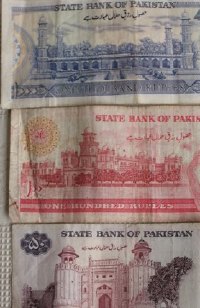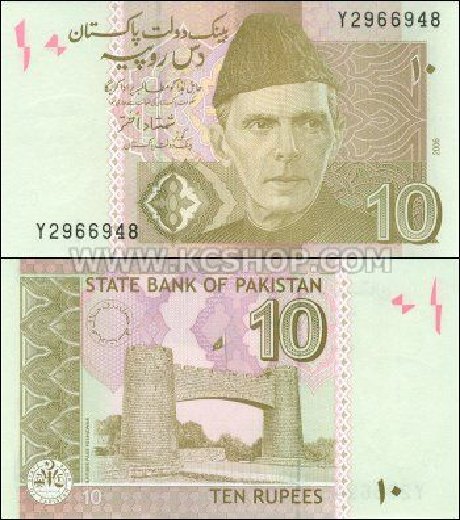
ATP Editor’s Comment: It turns out that, in fact, the said line (husool-e-rizq-e-halal ibaadat hai) does still exist on the new note. Our thanks to the readers who were able to catch the oversight that we failed to. However, we have kept the post live partly because the discussion is itself interesting and partly because the issue of whether having such a line on the note makes any difference on people’s behavior on ‘rizq-e-halal’, is itself an interesting topic.
Original Post: For many years every banknote in Pakistan reminded its owners that to make an honest living was a form of piety in itself.
No one really paid heed. And those who did probably laughed it away as a joke. The State Bank of Pakistan has therefore decided to stop that nonsense once and for all. If you don’t believe what I am saying then believe your own eyes here:
The old currency notes at the back were all inscribed in Urdu:
husool-e-rizq-e-halal ibaadat hai
making an honest income is prayer
Here is the face and back images of the old currency note of Rupee 10 denomination, prominently displaying that powerful statement:

And abracadabra: That wording has vanished from the all of the new currency denominations issued in 2006 onwards.
Witness for yourself this image of the new currency notes of Rupee 10 denomination below. Same is true for all other denominations too.

This could not have been decided by some graphic designer. No could it be attributed to some artist playing a practical joke on the Government, the State Bank or the Nation itself. It must be a conscious decision.
Has the government accepted its defeat in fighting corruption and removed whatever little symbolic semblance of ‘conscience-pricking’ these words might have generated? The guilt-trip imbeded into this little statement on the banknotes never did really work. Now we can accept something less that “rizq-e-halal” without even that reminder of guilt!
“Zinda Baad Rishwatâ€
Reference: World Paper Money Image Gallery.
See ATP Post on Coins of Pakistan.



















































No need to apologize Deeda-e-Beena and editors, in fact, you have given us a very interesting discussion and something to think about!
I do sincerely apologise for the incorrect impression my observation has created.
I also apologise to the hurt caused to the chaste sentiments expressed by some readers. The (72 year old eyes) Deeda-i-Beena did fail, which I can only regret.
Upon close scrutiny with a magnifying glass I found the statement in a circular form. Its size, format, placement, lettering and use of different hues of similar colors made it obscure. The earlier version might have had some impact on some. Who knows.
Once again I apologise.
My apologies for being facetious here.
It is true that the inscription is still there. But now itcomes with a realistic, if subtle, warning:
“husUl’e rizQe halAl” is still “ibAdat”, but it keeps you going in circles.
Asma, the reason it is not there on the one rupee note is that you can’t do much with it these days anway, halAl or harAm.
My beloved Urdu teacher in high school asked us if it wasn’t ironic ke insAn rishvat ke paisE sE makAn banAtA hae or darvAzE par likhtA hae ke “hAza min fazl’e rabbI”?
I can assure you it was way before Zia’s time :-).
Asma, I cannot be sure, but looking through the pictures of the old notes and based on my own memory and on MQ’s comment above, the first sign I see of this statement was in the “multicolor” one-rupee note introduced in 1981-82

Since we are in the apology mode here, let me add another.
In the early 1980s I as still in school but used to sometimes write in an Islamabad newspaper called <i>The Muslim</i>. It had a very popular column (on page 3) called “City Diary” which used to be edited by Ahmad Hasan, one of the most eminent journalists and finest human beings I have had the pleasure of knowing.
Anyhow, he asked me to write a “review” of the banknote (I was a stamp collector and used to write “reviews” of new stamps for City Diary sometimes). I don’t think I have a copy of the review now (this is all pre-computers) but I do recall that I had found the excessiveness of colors on the note to be inelegant but I think I had actually said that I liked the idea of having the line about “rizq-i-halal”. [At least, I seem to remember thinking that at some point!]. I should confess, however, that in retrospect my opinion now is much like the others – i.e., having that line does not really change anyone’s behavior…
Having said that, I am actually glad that the line still exists, even if it has been made very difficult to find and read!It may not mean much in practice, but it is a comfort to know that we at least cherish the sentiment.
The NEED to put ‘rizq-e-halal’ message arose around 1981. I didn’t see this message on notes before that.
It first appeared on redesigned Rupee 1 note in 1981.